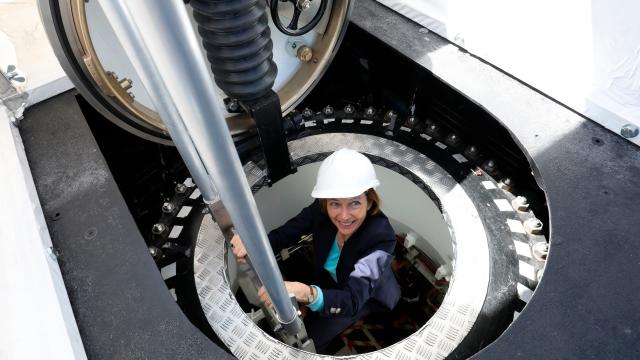An inventor buzzing around on a flyboard clutching a rifle and subsequently borking an attempt to cross the English Channel isn’t the only mildly science fiction-y development concerning the French military lately.
In the past week, French Defence Minister Florence Parly said that the country would launch miniature surveillance satellites brimming with defensive weaponry in the next few years, with options including spacecraft-mounted lasers and submachine guns under consideration, according to French newspaper Le Point (via Task & Purpose).
According to Le Point, the project will initially reallocate $US780 million ($1.128 billion) in additional funding to France’s existing $US4 ($6) billion space budget from 2021-2025 and involve 220 soldiers from various French military space agencies. The plan is to have the operation based out of a new airfield in Toulouse by 2025, with Parly saying that the project “will not be a fantasy, it will be a credible ambition.”
French President Emmanuel Macron first announced that the nation would be creating its own space force tasked with defending satellites in mid-July, though a Reuters report made no mention of space-based weapons systems.
Parly has proposed amending French law on space operations to allow the Ministry of Armed Forces more freedom to act under the supervision of the National Centre for Space Study and said she wanted patrol satellites in orbit by 2023, according to Task & Purpose. To start, the next generation of France’s Syracuse satellites will be equipped with cameras to watch for potential threats, but would later be joined by ones with weapons and that could be launched in large numbers on short notice — which the plan calls to be in the skies by 2030.
Parly said the technology would be used for defensive aims, not offence.
“If our satellites are threatened, we will consider blinding those of our opponents,” the minister told reporters, according to Task & Purpose. “This may involve the use of power lasers deployed from our satellites or from our patrol nano-satellites.” There was also mention of “submachine guns capable of breaking solar panels” on hostile spacecraft, the site wrote.
“Active defence is not an offensive strategy; it’s self-defence,” Parly added. “It is, when a hostile act has been identified as such, acceptable within the confines of international law to be able to respond in an appropriate and proportionate manner. The law does not exempt self-defence, does not prohibit militarisation, nor does it prevent weaponisation.”
Additional measures under consideration by France and prompted by an alleged Russian attempt in 2017 to hack into its Athena-Fidus communications satellite could include increased space surveillance and specialised training facilities, Task & Purpose wrote:
This could take the form of the development of a telescope network, the use of a geotracker network, the exploration of “satellite imaging radar capabilities”, equipping satellites with cameras, or testing a very long-range radar detector.
As part of the new program, Parly also alluded to a “space campus” and a “space academy” for promoting space careers.
The U.S. under Donald Trump has begun to form its own Space Force, though rather than an independent branch of the military it will be overseen by the Air Force.
Advocates of the move say that the U.S. military needs more focus on space as Russia and China develop anti-satellite weaponry, according to the New York Times, though Union of Concerned Scientists senior scientist Laura Grego told the paper that “If concentrating authority in a Space Force creates an incentive for nations to build space weapons that increase the likelihood of conflict, it would be a profoundly bad idea.”
[Le Point via Task & Purpose]
